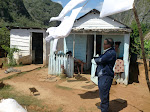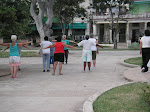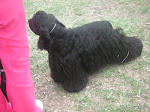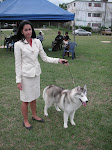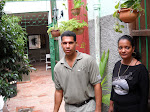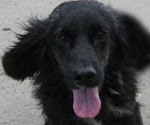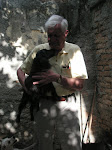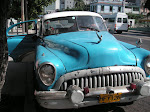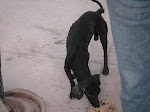Danny, Our First Border Collie
Happy Settles In
Recently I told the story of Happy's rescue from a life of
homelessness in northern Florida and of his move to our house. His first stop on that road was at our vet's
office for neutering. None of our dogs
or cats has ever been in our house without being sterilized. I first saw him as he was leaving the office
after the neutering. He was being
carried out because he wouldn't walk on a leash—so great was his terror of
humans. I was just beginning to
understand how much adjustment he faced and how much we faced as well.
We knew he was shy of human contact. You couldn't pet him, and if you even made a
move to touch him, he would dodge away from your hand. I thought perhaps he had never been touched
by a person. Off the leash in the house,
he found two best friends, our other dogs, Peachy and Princess. They hit it off right away. Our six cats were another matter,
however. Possibly Happy had never been
with a cat before. Most of our felines
stood their ground, and when curious Happy approached, they advanced, hissing
and growling. Happy knew enough to avoid
the batting front cat feet, and the cats never laid a glove on him. But we worried it could happen with possible
injuries. We took to discouraging cat interactions
which devolved into yelling for Happy to break off and come (not quite within
arm's reach as he still didn't want our petting).
House training also presented an ongoing problem. He would go a couple of days without an
accident, and then regress. I sensed it
would be a long learning process, so we had all the rugs removed from the house
and cleaned. Now we pad around in our
stocking feet on ceramic tile floors, which clean up easily. He's not reliable yet, but we're training
ourselves to get him into the dog's fenced back yard on his
schedule. Admittedly, we are wildly
optimistic and hopeful we'll eventually prevail—but it won't happen tomorrow.
Border Collies are herding dogs insistent that their charges
stay in a tight group, even if that means nipping at their legs to prod
them. Happy does this—not with sheep,
but with the humans in the house. His
nips can hurt, and he has been known to break the skin. We'll have to learn to calm him.
Now we are five weeks into our new association with Happy,
and if the next five weeks are as tough as the last ones, we'll both need to
move into an asylum. We talked it over
and decided Happy needs to have some formal training. As much as we like dogs and as many as we've
had, we've never had such a disruptive entity in our home. We have taken in many animals over the years
we've been together, and some previously had lived only in the outdoors, yet we
never had so much trouble with comportment, housetraining, destruction of
shoes, books, pillows etc. We both knew
we'd met our match and something needed to change. In spite of our desperate home situation, we
loved Happy as much as any of the others we've had.
Our wonderful vet, Marty Neher had the answer for us—a
professional dog trainer, Don Murray, who came to our house, met Happy, and
told us of his methods. An hour and a
half later we signed up for Happy's two week stay in Don's house for a course
of rigorous training. During his
interview with us, Don had calmed Happy down, answered our questions, and
calmed our fears.
Yesterday we said goodbye to Happy as he left for his stint
living in Dan's house with their other dogs and cats. Charlene and I were apprehensive and unhappy
at being separated for such a long time.
It's amazing to me that after 5 weeks of elimination atrocities
in our house, dog proofing to protect our possessions, yelling at him to leave
the cats alone, having him not come when called, trying to imagine if he needs
to go out in the back yard (guess wrong and you get to clean it up) that we
don't hate Happy, but it's quite the opposite.
Right now, in spite of the turmoil he's caused us, we dread the 2 weeks
we must be without him. He only left
yesterday, but we're already counting the days until his return.
Almost no one can define "love," but our
attachment to Happy after weeks of unexpected problems and stress serves as
good an operative definition as I can come up with.
Les Inglis













